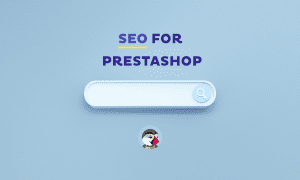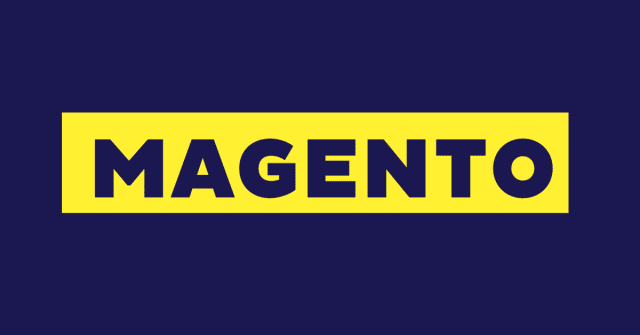Are you looking to launch an online store? Choosing the right eCommerce platform is crucial for your business’s success.
With numerous options available, finding the best eCommerce platform that meets your unique needs can be overwhelming.
In this article, we will explore the top eCommerce platforms, including Shopify, WooCommerce, and BigCommerce, and compare their features, pricing, and ease of use.
Whether you’re a startup or an established business, this comprehensive guide will help you make an informed decision and select the best eCommerce platform for your online store.
What Is an eCommerce Platform?
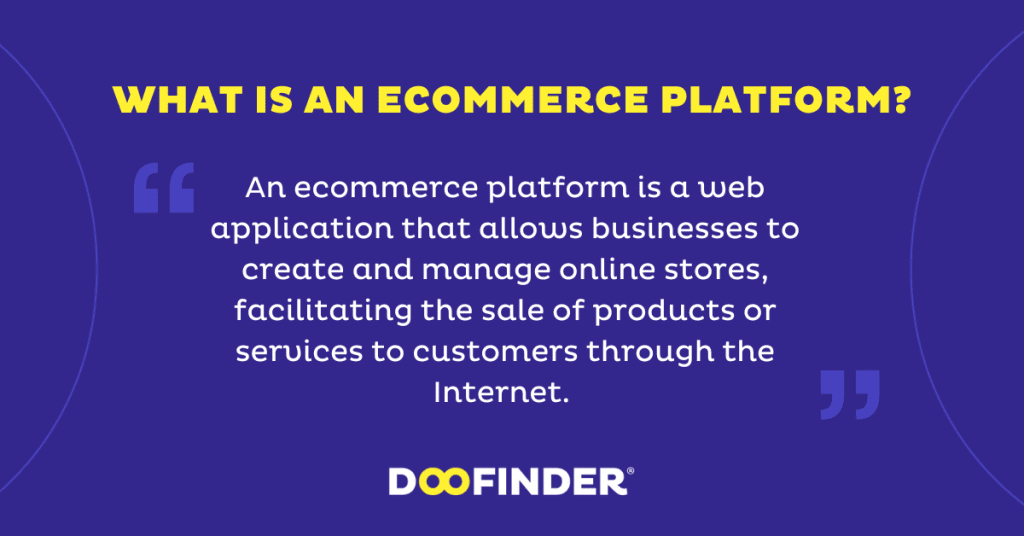
An eCommerce platform is a web application that allows businesses to create and manage online stores, facilitating the sale of products or services to customers through the Internet.
With features such as product catalog management, inventory control, and secure payment processing, eCommerce platforms streamline the eCommerce process.
Businesses can establish a strong online presence, expand their customer base, and boost revenue by leveraging an eCommerce platform, all while ensuring a secure and scalable online selling experience.
How To Choose a Suitable eCommerce Platform for Your Business

Choosing a suitable eCommerce platform for your business is a crucial decision that can greatly impact your online success.
With numerous options available, it’s essential to carefully evaluate each platform based on key factors to ensure the best fit for your business needs and goals.
Here are some important points to consider when choosing an eCommerce platform:
- Business Size and Scale: Consider the size and scale of your business when selecting an eCommerce platform. Some platforms are designed for small businesses with basic features, while others are better suited for larger enterprises with more complex requirements.
- Customization and Flexibility: Look for an eCommerce platform that offers customization and flexibility to align with your brand image and business requirements.
- Payment Processing Options: Evaluate the payment processing options offered by the eCommerce platform. Find a platform that supports a variety of payment options. These should include credit cards, digital wallets, and other popular payment gateways to provide convenient and secure payment methods for your customers.
- SEO Features: SEO (Search Engine Optimization) plays a significant role in driving organic traffic to your online store. Choose an eCommerce platform that provides built-in SEO features, such as customizable URLs, meta tags, and sitemaps.
- Security and Compliance: Security is critical for protecting customer data and ensuring safe transactions. Look for an eCommerce platform that provides robust eCommerce security features, such as SSL encryption, PCI compliance, and regular updates.
- Mobile Responsiveness: With the increasing use of mobile devices for online shopping, it’s crucial to have a mobile-responsive online store.
- Support and Customer Service: Consider the level of support and customer service provided by the eCommerce platform. Look for platforms that offer reliable customer support channels, such as email, live chat, FAQ chatbots, or phone, and provide documentation, tutorials, and community forums to assist you in setting up and managing your online store.
- Pricing and Costs: Evaluate the pricing and costs associated with the eCommerce platform, including setup fees, transaction fees, monthly or annual subscription fees, and additional add-on costs. Consider your budget and business requirements to choose a platform that offers a pricing strategy that aligns with your financial goals.
- Marketing features: Marketing is essential to drive traffic and sales to your online store. It is highly important to consider features like social media integration, abandoned cart emails, pop-up windows, coupons…
eCommerce platform comparison
| Platform | Pricing | Customer Support | User’s Rating (G2.com) | Ease of Use | Flexibility (Design & Themes) | SEO Friendliness | Features |
| Wix | Free | 4 | 4.2 (1,587) | 4 | 5 | Good | – Drag-and-drop website builder – Customizable templates – eCommerce capabilities – Blogging tools – App Market for additional functionality |
| Shopify | Low | 5 | 4.4 (4,288) | 5 | 5 | Good | – Wide range of customizable themes – Payment gateways integration – Inventory management – SEO tools |
| WooCommerce | Free | 4 | 4.2 (1,057) | 4 | 4 | Good | – Flexible product and inventory management – Customizable design – Payment gateway options – Extensions for additional functionality |
| Ecwid | Low | 4 | 4.8 (285) | 4 | 3 | Moderate | – Responsive design – Multichannel selling – Payment gateway options – Inventory and order management |
| Squarespace | Moderate | 3 | 4.4 (1,028) | 3 | 5 | Moderate | – Elegant templates – Customizable design – Blogging tools – SEO features |
| BigCommerce | Moderate | 4 | 4.2 (455) | 4 | 4 | Moderate | – Responsive design – Payment gateway options – Product management SEO tools |
| OpenCart | Free | 3 | 4,3 (100) | 3 | 3 | Moderate | – Open-source eCommerce platform – Customizable design – Product and inventory management – Payment gateway options – Multi-language support |
| Shift4Shop | High | 5 | 3.8 (32) | 5 | 5 | Good | – Built-in payment processing – Customizable design – Inventory management – SEO tools – Marketing and promotional features |
| Weebly | Moderate | 3 | 4.2 (448) | 3 | 3 | Low | – Drag-and-drop website builder – Customizable templates – Payment gateway options – Blogging tools – SEO features |
| Dukaan | Free | 3 | 4.5 (18) | 4 | 3 | Moderate | – eCommerce platform for Indian businesses – Mobile app-based – Product listing and inventory management – Payment gateway options – Order management and tracking |
| PrestaShop | Free | 4 | 4.5 (145) | 4 | 4 | Good | – Open-source eCommerce platform – Customizable design – Product and inventory management – Payment gateway options – Multi-language support |
| nopCommerce | Free | 4 | 4.4 | 5 | 5 | Good | – Unlimited customization – Multi-store and multi-vendor (marketplaces) support – Multiple languages and currencies – Mobile commerce and responsive design – Headless support (web API) |
The 12 Best eCommerce Platforms
eCommerce has become an essential part of modern business, and choosing the right eCommerce platform is crucial for the success of your online store.
With so many options available, here are 12 of the best eCommerce platforms to consider:
Wix: Best eCommerce Platform for Small Business
Wix is a popular all-in-one website builder that’s perfect for small businesses looking to create an online store. With its easy-to-use drag-and-drop site editor, merchants can customize their websites to match their unique branding and design preferences without needing coding skills.

One of the great things about Wix is its flexibility in accommodating different types of online stores. Whether you’re selling physical products, digital downloads, or services, Wix has options that suit various business models.
Its feature-rich plans allow merchants to sell unlimited products, recover abandoned carts, and set up recurring payments, giving them the flexibility and scalability they need to grow their online business.
In addition to its eCommerce functionalities, Wix has evolved into a complete business solution. It offers enterprise-grade security measures to protect customer data and transactions, advanced SEO tools to improve search engine visibility, and marketing tools to promote products and engage with customers.

Wix also boasts a powerful infrastructure, ensuring that online stores have reliable and fast loading times for a seamless shopping experience.
Wix has an extensive collection of templates, including 122 free templates specifically designed for online stores.
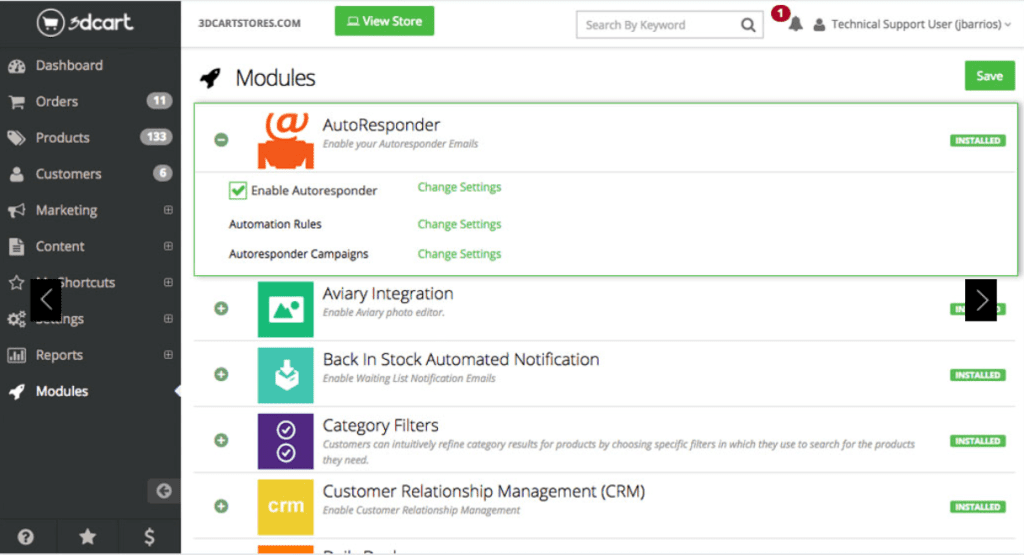
This allows merchants to choose from a wide range of professionally-designed landing page templates that cater to different industries and design preferences.
While Wix offers a free plan with limited features, its premium plans provide access to advanced eCommerce features, including options for inventory management, shipping, tax settings, and abandoned cart recovery, making it a suitable option for small businesses that require more robust eCommerce functionalities.
Pros
- All-in-one website builder with an easy-to-use drag-and-drop editor
- High-quality online store templates for customization
- Flexible options for different types of online stores
- Feature-rich plans for scalability and growth
- Complete business solution with advanced SEO and marketing tools
Cons
- Limited features on free plan
- Premium plans required for advanced eCommerce functionalities
- May not be suitable for larger businesses with complex needs
- Limited customization options without coding skills
- Pricing plans may not fit all budgets
Pricing
- Business Basic plan: $24/month
- Business Unlimited plan: $36/month
- Business VIP plan: $53/month
Shopify: Best Platform for Ease-of-Use
Shopify is a popular eCommerce platform that’s known for being user-friendly and catering to small merchants who want to set up an online store quickly.
It’s got an intuitive interface and a user-friendly dashboard that lets you manage everything from inventory and shipping to marketing and online payments all in one place. It’s a convenient and efficient solution for small businesses.
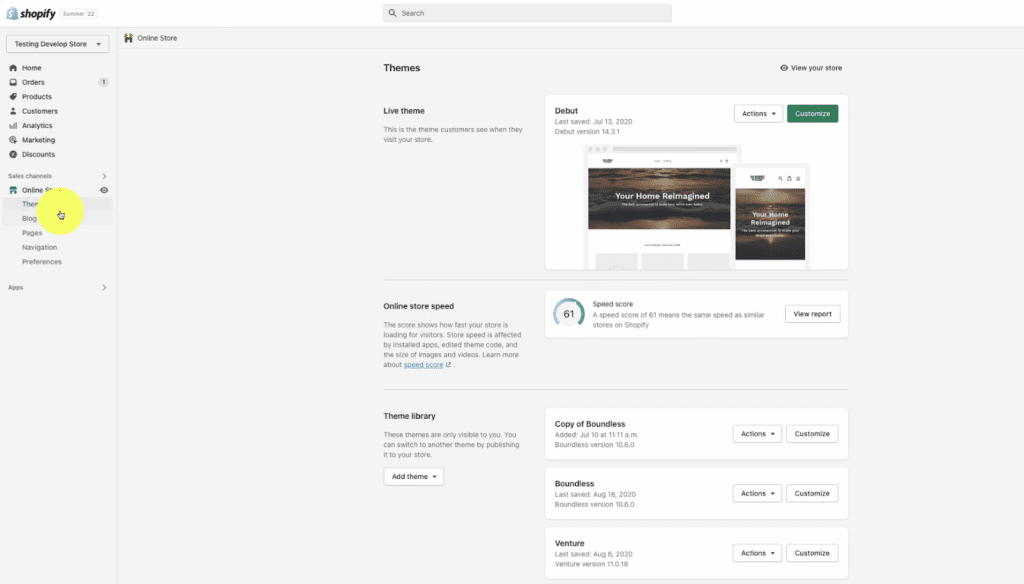
Shopify offers very flexible pricing plans, which start as low as $5 per month, making it affordable for businesses of any size. You can choose from a range of plans that suit your needs and budget, and easily upgrade or downgrade as your business grows or changes.
This scalability makes it a viable option for businesses that are just starting out or have limited resources.
Now, when it comes to SEO optimization, we found that Shopify does have some limitations in terms of customizing URL structures and meta tags. But it excels in other areas like dropshipping and social media marketing.
The platform seamlessly integrates with popular dropshipping apps, making it easy to set up and manage your dropshipping business. Plus, it offers robust marketing tools like email marketing, social media integrations, and discount code creation to help you promote your products and drive sales.

If you’re a larger business with more complex needs, Shopify Plus might be the right fit for you. It’s their enterprise-level solution that offers advanced features and customization options.
With Shopify Plus, you get additional functionalities like custom checkout, advanced analytics, and dedicated support, which are tailored to the unique requirements of larger businesses and high-volume merchants.
Pros
- User-friendly interface and easy-to-use dashboard.
- Flexible pricing plans starting from $5 per month.
- Robust inventory management, shipping, and online payment options.
- Shopify Plus for advanced features and customization.
- Wide range of themes, plugins, and integrations for customization.
- Helpful onboarding wizard for beginners.
Cons
- Limitations in SEO customization.
- May not be ideal for large stores with complex needs.
- Additional costs for plugins, themes, and integrations.
- Transaction fees for using third-party payment gateways.
- Customization may require coding knowledge.
- Limited scalability for high-volume sales.
- Some features are restricted to higher-priced plans.
Pricing
- Basic plan: $29/month
- Shopify plan: $79/month
- Advanced plan: $299/month
- Shopify Plus plan: $2000/month
- A 14-day free trial available
Woocomerce: Most Popular eCommerce Platform
WooCommerce is a free eCommerce plugin that’s designed to work seamlessly with WordPress websites, making it a popular choice for those who already have a WordPress site set up.
It’s a user-friendly option that makes selling online easy, and it comes with a wide range of customization options through its many available extensions.
With WooCommerce, you can turn your WordPress website into a fully functional online store. It offers a variety of plugins for integrating payment gateways, social media, email marketing, 1-click selling, and shipping, allowing you to create a tailored eCommerce experience for your customers.
WooCommerce also supports different types of products, including physical items, digital downloads, subscriptions, and more.
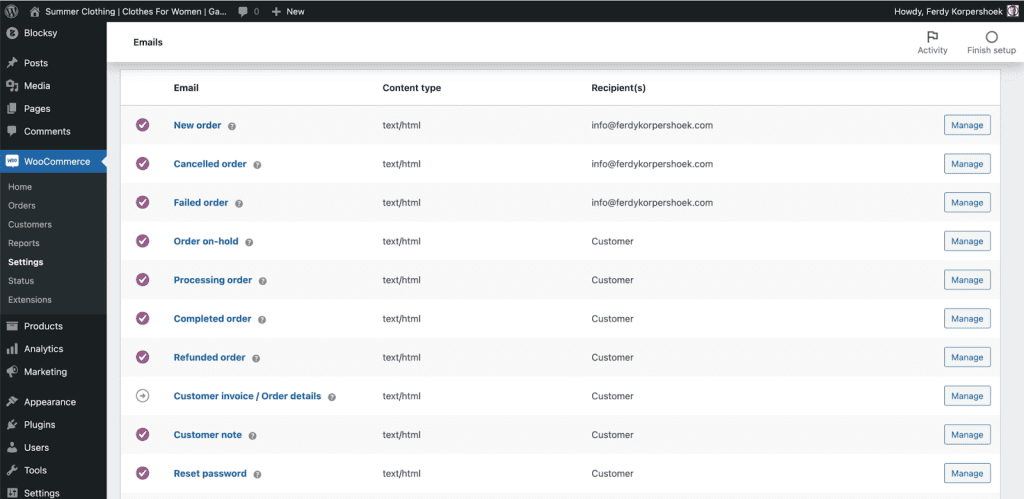
Since it’s an open-source platform, developers can create and implement custom themes and plugins to meet specific business needs. This makes it a great option for businesses looking for unique and personalized online stores.
However, it’s important to note that setting up and managing WooCommerce may require some technical knowledge, especially if you’re not familiar with WordPress, as most of your time will be spent on WordPress creating the site.
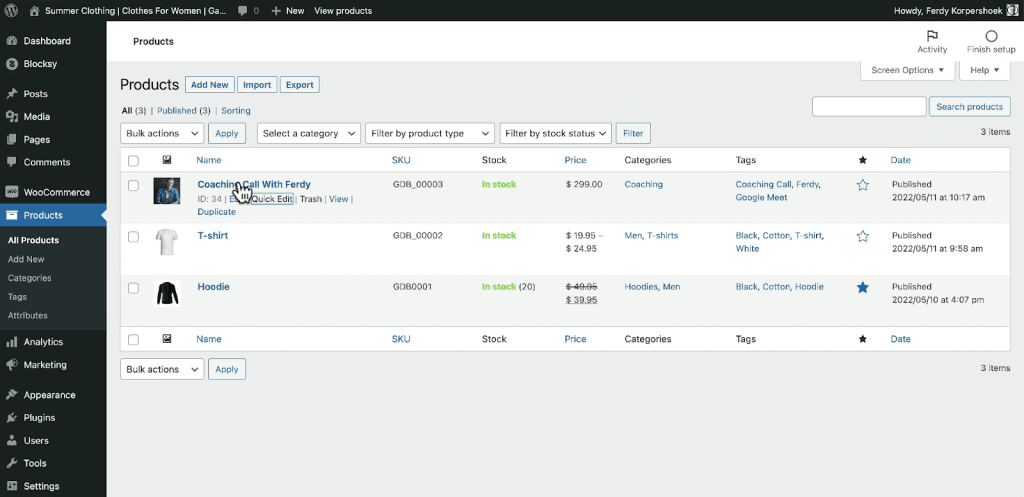
Based on our testing WooCommerce may not have all the advanced sales features of dedicated eCommerce platforms like BigCommerce and Shopify, but it’s still a great solution for running both an eCommerce store and an affiliate site together.
However, you can compensate for it with numerous integrations with different email marketing features. For example, native WooCommerce & Moosend integration allows you to optimize conversion rates with cart abandonment and product recommendation emails at the click of a button.
Pros
- Free and open-source
- Customizable with many extensions and themes
- Integrated with WordPress
- Versatile product support
- Large user community
Cons
- Technical knowledge required
- Hosting and security considerations
- Limited advanced sales features
- Limited official support options
- Regular updates and compatibility maintenance
Pricing
- Free to use, open-source eCommerce platform.
nopCommerce: Best for Flexibility and Scalability
nopCommerce is a free open-source ASP.NET-powered eCommerce platform. It is ideal for medium- and large-sized B2B and B2C enterprises because to its infinite customization options, great flexibility and scalability, and strong security.
nopCommerce comes with features like multi-vendor, multi-store, and omnichannel right out of the box, making it a comprehensive enterprise eCommerce solution. nopCommerce’s security is guaranteed by GDPR compliance and PCI DSS certification. 1,500 integrations can be added to nopCommerce to increase its default capabilities.
Support for several currencies and languages enables companies to connect with clients worldwide. To facilitate seamless foreign transactions, nopCommerce also provides easy integration with shipping providers, tax calculators, and international payment systems.
nopCommerce also includes features for managing multiple warehouses, helping streamline inventory and logistics. The platform is optimized for mobile commerce, featuring a responsive design that works seamlessly across devices. It also offers headless support through a web API, providing flexibility for front-end development, and includes a mobile app for iOS and Android, enabling businesses to sell their products to clients on the go.
nopCommerce allows businesses to offer individual pricing for customers, enhancing personalization. It features a fast full-text search to help customers find products quickly, and supports various payment methods, ensuring flexibility at checkout.
Pros
- Extremely customizable with its pluggable nature and publicly available source code
- Completely free to use coming with a lot of powerful out-of the box features
- High performance (100/100 in Google PageSpeed)
- Powerful marketing, product management, and checkout features
Cons
- Additional payments for custom themes and some plugins
- Need for technical knowledge for more advanced projects
- No free technical support, only Premium support available
Pricing
- Free to use, open-source eCommerce platform
Ecwid (by Lightspeed): Best Free eCommerce Platform
Ecwid by Lightspeed is a top eCommerce platform that makes it easy to integrate online stores into any webpage or social media profile. With a global presence in over 175 countries, Ecwid offers a user-friendly solution that’s accessible to businesses of all sizes.
One of its standout features is the absence of transaction fees, which makes it an attractive choice for businesses looking to maximize their profit margins.
Ecwid offers a free plan for starting stores, making it a great option for entrepreneurs and small businesses to launch their online ventures without incurring additional costs. As businesses grow, Ecwid provides affordable upgrade tiers with advanced features to meet the evolving needs of online retailers.
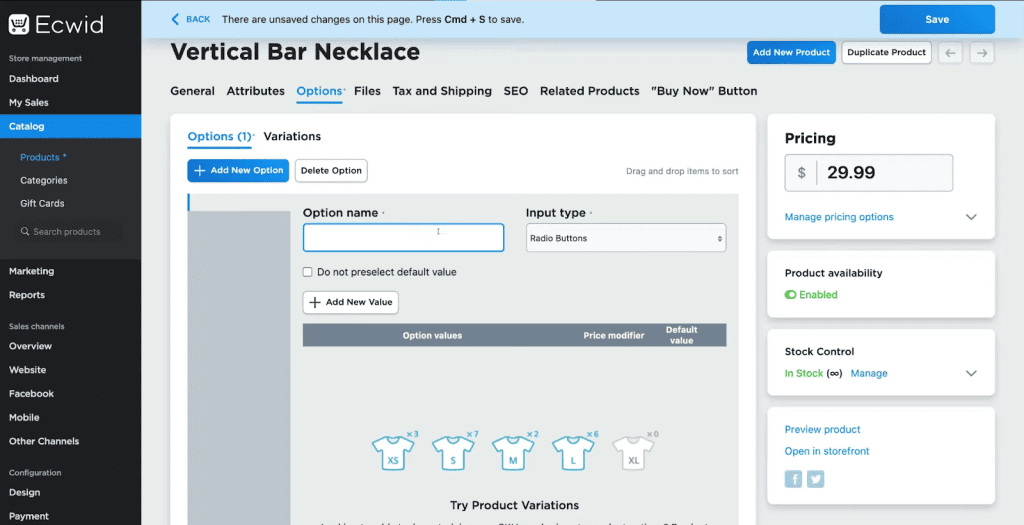
One notable advantage of Ecwid is its focus on mobile commerce. The platform provides a dedicated mobile app that allows merchants to manage their online stores and track sales on the go, which we found very convenient.
Here’s a video from their YouTube channel that shows how you can set up the mobile app.
Additionally, Ecwid offers point-of-sale (POS) integrations, enabling businesses to seamlessly connect their online and offline sales channels for efficient management of sales, marketing, and merchandising.
It also offers a wide range of marketing tools and integrations to help businesses drive traffic, convert customers, and boost sales. From social media integrations to email marketing and abandoned cart recovery, Ecwid equips merchants with the necessary tools to optimize their online store’s performance.
Unfortunately, Ecwid does have a narrower range of advanced sales features compared to other eCommerce platforms. Additionally, while Ecwid offers customer support, it may not have the same level of comprehensive official support options as some other platforms.
Pros
- Easy integration
- Global presence
- No transaction fees
- Free plan
- Mobile commerce focus
- Marketing tools and integrations
Cons
- Limited advanced sales features
- Support options
- Customization limitations
Pricing
- Free
- Venture: $19/month
- Business: $39/month
- Unlimited: $99/month
Squarespace: Best for Niche Market
Squarespace is a popular eCommerce platform known for its sleek templates and excellent design capabilities. It’s a top choice for print-on-demand eCommerce businesses that want a visually appealing online store with high levels of customization.
Squarespace offers both style and substance, making it a standout recommendation for users seeking an online store that looks great and performs well.

Affordability is one of the advantages of Squarespace, with pricing starting at just $23 per month for the Business package. This plan allows users to sell an unlimited number of products and offers a wide range of customization options, giving merchants the flexibility to create a unique and personalized online store.
Another notable feature of Squarespace is its user-friendly interface, making it easy for merchants to set up and manage their online store without needing extensive technical knowledge.
Their updated website designer allows for on-page editing, which makes it super easy to create the page the way you’d like.
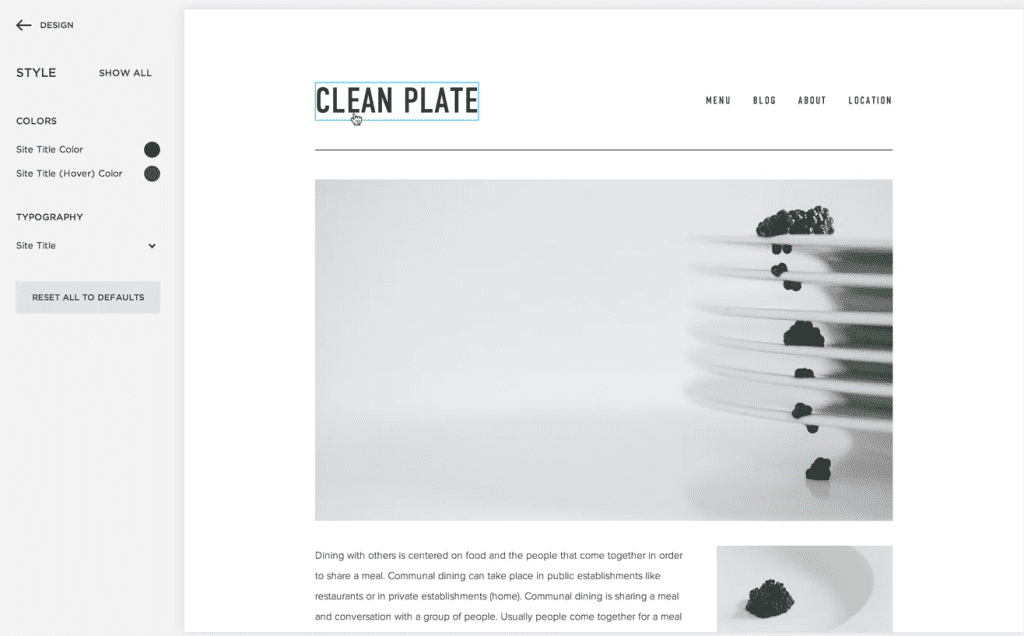
The platform also offers reliable hosting, SSL security, and 24/7 customer support to ensure a smooth and secure eCommerce experience.
However, it’s important to note that Squarespace does not offer a free plan, which may not be suitable for budget-conscious merchants.
Squarespace might not be best suited for large brands who want full customization and control of their website, as advanced sales features and complex eCommerce solutions aren’t present.
Pros
- Beautiful and professional design
- All-in-one solution with hosting, domain registration, and CMS
- Easy-to-use on-page editor
- Mobile-responsive templates
- Built-in features like blogging and eCommerce
Cons
- Limited customization options
- Higher cost compared to some other website builders
- Less third-party integrations
- Updates are handled by Squarespace
- Learning curve for beginners or users with limited technical skills
Pricing
- Personal plan: $23/month
- Business plan: $33/month
- Basic Commerce plan: $36/month
- Advanced Commerce plan: $65/month
BigCommerce: Best for Large Sites & Inventory Management
BigCommerce is widely regarded as the best overall eCommerce platform, offering a wide range of features and functionalities that make it suitable for businesses of all sizes.
With its robust product search engine, it is particularly ideal for larger retail brands that require advanced search capabilities to manage a large inventory.

In addition to being a top choice for established retail brands, BigCommerce is also a great option for those who are just starting out with their eCommerce store or have a brick-and-mortar store and want to expand their operations online.
Its user-friendly interface allows you to customize your online shop without needing coding skills, thanks to its extensive collection of customizable templates that can be used to design, sell, and market your products.
This is mainly due to the easy-to-use drag-and-drop feature, that you use to build your site.

This makes it accessible to those without advanced web development skills, while still offering options for tech-savvy users to tweak HTML and CSS for more control over the web design.
One of the standout features of BigCommerce is its headless eCommerce structure, which allows for maximum customization for larger companies.
This means that businesses can separate the front-end and back-end of their eCommerce store, enabling them to have more flexibility and control over the customer experience, branding, and user interface.
This makes it a popular choice for businesses that require a high level of customization and integration with other systems.
Pros
- Robust eCommerce functionalities for online stores
- Customizable design options
- Integrated payment gateways and shipping options
- Scalable and suitable for large businesses
- Excellent SEO capabilities for improved visibility
Cons
- Steeper learning curve for beginners
- Higher pricing compared to some other eCommerce platforms
- Limited number of free themes
- Customization may require coding skills
- Updates may require manual handling and maintenance
Pricing
- They offer a 15-day free trial
- Standard plan: $29.95/month
- Plus plan: $79.95/month
- Pro plan: $299.95/month
Opencart: Best Value for Money
OpenCart is a powerful and flexible open-source eCommerce platform that gives merchants extensive customization options and a user-friendly interface. It’s perfect for businesses with multiple online sales channels, as it allows them to manage multiple online stores from a single administrative area.
One of the strengths of OpenCart is its wide range of professionally-written extensions that can easily be installed to add various functionalities to the online store.

These extensions include payment gateways, shipping options, marketing tools, social media integrations, and more, giving merchants the ability to enhance their online store’s functionality and performance based on their unique requirements.
Setting up an online store with OpenCart is quick and straightforward. After installation, merchants can choose from a variety of free or low-cost templates from template sites and easily customize the appearance and layout of their online store.

Product descriptions and photos can be added, and settings can be configured with ease, allowing merchants to get their stores up and running quickly and efficiently.
Another advantage of OpenCart is its active community of users and developers. The platform has a large community of users who actively contribute to its development, provide regular updates, and offer support through documentation, forums, and online resources.
This means that merchants have access to the latest features, bug fixes, and security patches, and can seek assistance whenever needed.
However, it’s important to note that OpenCart may require a certain level of technical expertise to fully utilize its features and functionalities.
While it is generally considered user-friendly, merchants with limited technical skills may need some time to familiarize themselves with the platform and its settings.
Additionally, as an open-source platform, merchants are responsible for security and updates, which may require regular monitoring and maintenance compared to hosted platforms.
Pros
- Feature-rich and flexible open-source eCommerce platform
- Extensive library of extensions for added functionalities
- Active community of users and developers for support
- Suitable for businesses with multiple online sales channels
- Fastest website load time
Cons
- May require technical expertise for full utilization
- Merchant responsibility for security and updates
- Limited customization options without coding skills
- Updates and maintenance may require manual handling
- May have a learning curve for merchants with limited technical skills
Pricing
- No monthly fees
Shift4shop: Best for Solopreneurs
Shift4Shop is an all-in-one eCommerce platform that caters to the needs of entrepreneurs looking to establish and grow their businesses online.
It offers a free solution with powerful tools designed to streamline the eCommerce experience, making it easy for businesses to create professional-looking online stores without requiring any coding skills.
The website builder is user-friendly and provides a range of customization options, allowing businesses to create a unique and branded online presence. Here’s a video from Shift4Shop showing how easy it is.
In addition to the website builder, Shift4Shop also offers robust product and order management features. Businesses can easily manage their inventory, track orders, process payments, and handle shipping and fulfillment seamlessly within the platform, ensuring efficient operations of their online stores.
Shift4Shop also includes customer marketing tools that help businesses reach and engage with their target audience effectively. The platform offers features such as email marketing, discounts, promotions, and abandoned cart recovery, which are crucial in building customer loyalty and increasing sales.

(Source)
Shift4Shop has been designed to be SEO-friendly in nature. The platform is designed to be highly search engine optimized, with pre-optimization for every part of the website. This helps businesses improve their online visibility and rankings on search engines, leading to more organic traffic and potential customers.
It offers seamless integration with various sales channels, including online marketplaces, social media, and mobile devices, providing businesses with multiple avenues to reach their customers.
Pros
- Comprehensive feature set
- Free solution for solopreneurs
- User-friendly website builder
- Search engine-friendly
Cons
- Limited scalability for larger businesses
- Some advanced features may require additional costs
- Limited design customization options
- Possible dependence on third-party integrations for certain functionalities
Pricing
- Free (minimum $500 processed per month)
Weebly (by Square): Best for Getting Up and Running Quickly
Weebly is a user-friendly website builder that is known for its budget-friendly plans, making it a popular choice for online retailers.
With a simple drag-and-drop interface, Weebly allows merchants to create professional-looking websites, blogs, and online stores without the need for technical expertise.

Weebly is known for its range of customizable templates, which are designed to be visually appealing and responsive across different devices. These templates cater to various industries and design preferences, allowing merchants to create a unique online store that aligns with their brand identity.
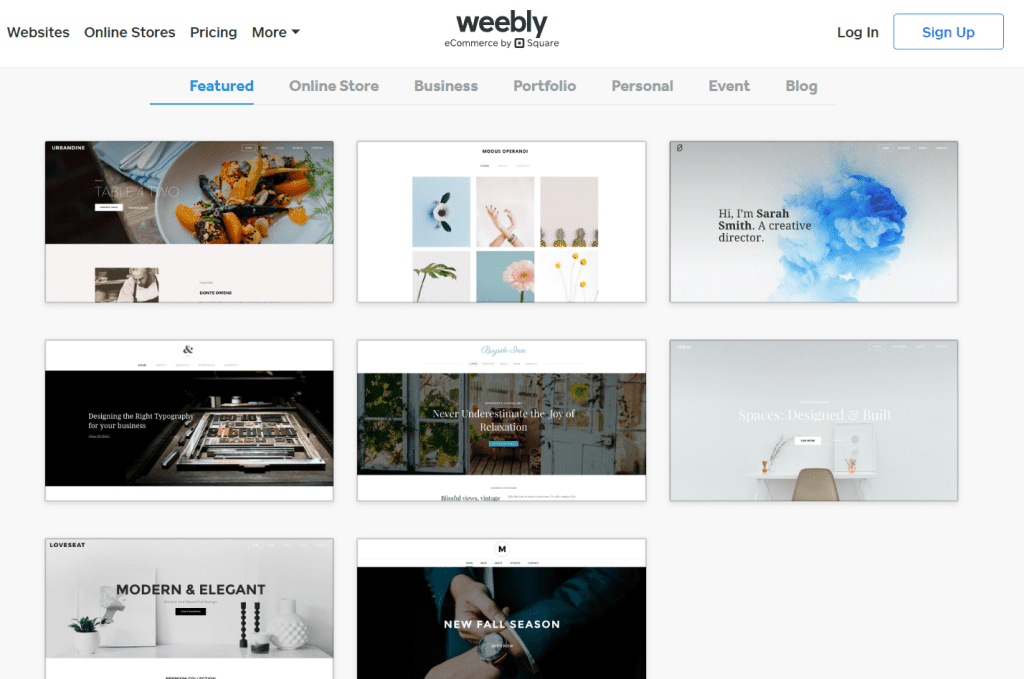
Weebly is owned by the same company as Square, a well-known payment processing provider, which brings added benefits for online retailers.
Weebly is now integrated with Square’s product suite, enabling seamless payment processing across all sales channels, including online, in-person, and mobile. This integration simplifies the payment process for merchants, allowing them to manage their payments and sales in one unified platform.
In addition to its website building and payment processing capabilities, Weebly also offers a range of tools and features designed specifically for online retailers.
These include options for inventory management, order management, shipping and tax settings, and coupon code creation, providing merchants with essential eCommerce functionalities to manage their online store efficiently.
Weebly also provides customer support through various channels, including live chat, email, and community forums, ensuring that merchants have access to assistance when needed.
This support system can be helpful for beginners or those who may encounter technical difficulties while building and managing their online store.
Pros
- User-friendly website builder with drag-and-drop editor
- Variety of templates for customization
- Suitable for different types of online stores
- Affordable pricing plans
- Integrated SEO and marketing tools
Cons
- Limited customization options compared to some other platforms
- Basic features on free plan
- May not be ideal for larger businesses with complex needs
- Limited scalability and advanced functionalities
- Customer support options may be limited for some plans
Pricing
- Free
- Personal: $13/month
- Professional: $16/month
- Performance: $26/month
Dukaan: The New Entrant To Keep an Eye On
Launched in 2020, Dukaan is a relatively new eCommerce platform that has gained popularity for its user-friendly, no-code approach to online store creation. It is designed to be simple and intuitive, making it accessible to businesses of any size, including small businesses and large enterprises alike.
One of the key features of Dukaan is its focus on speed, performance, and simplicity. The platform offers a streamlined and efficient process for setting up an online store, allowing merchants to quickly and easily launch their eCommerce venture.
Here’s a video from their YouTube channel showing how you can set up an eCommerce shop within 5 minutes.
Dukaan’s user-friendly interface and intuitive design make it easy for merchants to create a professional-looking online store without the need for technical expertise or coding skills.
Dukaan offers a robust eCommerce experience with a wide range of features to help merchants manage their online stores effectively.
Merchants can easily list products, set up payment gateways, and manage orders and inventory, all from a simple and user-friendly dashboard. The platform also offers options for customization, allowing merchants to brand their online store to match their unique business identity.
One of the strengths of Dukaan is its scalability. The platform is designed to help businesses grow rapidly, providing tools and features that enable merchants to scale their online store as their business expands.
Dukaan offers flexibility in terms of product listings, payment options, and integrations with other services, allowing merchants to adapt their online store to their changing needs.
Dukaan also offers a range of payment options, including support for multiple payment gateways, making it convenient for merchants to accept payments from customers around the world.
Another notable aspect of Dukaan is its customer support. The platform provides responsive customer support through various channels, including live chat, email, and community forums, ensuring that merchants have access to assistance when needed.
Pros
- Mobile-centric, designed for mobile devices
- User-friendly, no coding or technical skills required
- Quick setup process, allows users to create an online store within minutes
Cons
- Limited customization options compared to other platforms
- Limited integrations and features compared to more established eCommerce platforms
- May have limitations in scalability for larger businesses or complex online stores
- It seems that the customer support is not performing at its full potential yet
Pricing
- Entrepeneur: $149.99/year
- Agency: $499.99/year
- Enterprise: Custom pricing
PrestaShop: The Best for Versatility
PrestaShop is a popular open-source eCommerce platform that originated in France and is used by over 300,000 websites globally.
Known for its flexibility and scalability, PrestaShop offers a suite of modules that includes secure payment solutions, performance analysis, and web marketing tools, making it easy for businesses to deploy and manage their online store on a larger scale.

One of the key strengths of PrestaShop is its highly flexible and scalable platform. The platform allows businesses to create and customize their online store according to their unique requirements.
Merchants have complete ownership and control over their online store, allowing them to customize it to match their brand identity and business goals.
PrestaShop offers a wide range of features designed to help businesses establish and manage their online store efficiently. The platform provides secure payment solutions, allowing merchants to accept payments from customers securely and easily.
It also offers very convenient performance analysis tools, which help businesses track and analyze their online store’s performance, identify areas of improvement, and make data-driven decisions. Additionally, PrestaShop provides web marketing tools, including SEO optimization and social media integration, to help businesses promote their online store and drive more traffic to their website.

Being an open-source eCommerce platform, PrestaShop is free to use and provides access to its source code, allowing businesses to modify and customize their online store as needed.
This gives merchants the freedom to create a unique online store that aligns with their specific requirements and business objectives.
Pros
- Open-source, allowing for customization and flexibility
- Wide range of features and functionalities, suitable for various types of online stores
- Active community of users and developers, providing regular updates and support
- SEO-friendly, with built-in features for optimizing online store for search engines
Cons
- Requires technical expertise to fully utilize all features
- Steeper learning curve compared to some other platforms
- May require additional maintenance and security measures compared to hosted platforms
- Limited customer support options compared to paid platforms
Pricing
- Free
Our reviewing process
To provide an accurate review, we carefully selected 12 platforms based on essential criteria for successful merchant operation. Our considerations ranged from customer and support service, ease-of-use, flexibility, number of eCommerce-related features, pricing and associated costs.
Once we identified what we considered the best eCommerce platforms, we contacted the providers for additional information and conducted a thorough analysis. We further refined our approach by investigating merchants, customer reviews, and other information sources (i.e. other website reviews and online documentation) while keeping in mind specific factors.
Additionally, we couldn’t produce a reliable review without doing software testing. Hence, we took the time to explore some of the different platforms listed.
Evaluation factors
- Pricing and associated costs: We evaluated the rates and compared them to the overall features and offerings of each platform. Although some platforms may offer free plans, they may come with higher processing fees and/or limited features in return.
- User ratings and reviews: User ratings and reviews were considered as important factors in assessing the different platforms. We valued customer testimonials and feedback as a way to gain another perspective on our analysis.
- Ease-of-use: Platform convenience and intuitiveness played a significant role in our evaluation. Some platforms can be complex to set up and use or require deeper knowledge. We evaluated whether they had a drag-and-drop system, a user-friendly interface, and what customers emphasized in their testimonials.
- Flexibility: The level of control is essential, particularly in terms of design, themes, and other related features. While some platforms may offer a high level of customization, it can also raise the complexity level. This factor can have more or less value depending on the business goals and needs.
- Overall features: Features have been considered as highly important factors. They include mobile-friendliness, marketing features, analytical features, and various extensions.
- Customer service and support: A key factor in our opinion. It helps users navigate and understand the platform’s features and capabilities, leading to more effective use and better over experience. It allows users to address technical issues or problems they encounter while using the platform, preventing frustration and saving time.
- SEO friendliness: Search engine results are an important organic traffic driver, so we identified SEO friendliness as a moderately important factor. Its importance may vary depending on different niches and merchants’ selling strategies.
Get Your eCommerce Store Up and Running Today!
Selecting the best eCommerce platform is a critical decision for your online store’s success. By evaluating factors such as features, pricing, ease of use, and scalability, you can make an informed decision based on your business requirements.
Whether you choose Shopify for its user-friendly interface, WooCommerce for its flexibility, or BigCommerce for its robust features, remember to carefully consider your business needs and budget. With the right eCommerce platform in place, you can create a seamless online shopping experience for your customers and drive your online business to new heights.
Now that you’ve identified the platform that suits you best, it’s time to discover what the best eCommerce search tool is for integration.
FAQs
1. What is the best eCommerce platform?
A: With various options available, including Shopify, WooCommerce, and BigCommerce, the best eCommerce platform depends on your specific needs, budget, and level of customization required.
2. Which eCommerce site is most used?
A: Amazon dominates the eCommerce market with the highest usage, making it the go-to platform for many online shoppers and sellers alike.
3. Is Shopify the best platform for eCommerce?
A: Shopify is a popular choice for eCommerce businesses due to its user-friendly interface, robust features, and extensive app marketplace, making it a top contender for many online sellers.
4. What is the easiest eCommerce site to use?
A: Shopify is often considered one of the easiest eCommerce platforms for beginners, as it provides a simple setup process, intuitive navigation, and helpful customer support.
5. What is the best eCommerce platform for startups?
A: Shopify and WooCommerce are popular choices for startups, as they offer affordable pricing plans, easy setup, and scalability options to accommodate the needs of growing businesses.
6. Is Shopify better than Wix for eCommerce?
A: While Wix is a versatile website builder, Shopify is generally preferred for eCommerce due to its specialized features, such as inventory management, payment gateways, and order processing.
7. What is the fastest-growing eCommerce sector?
A: eCommerce in the health and beauty, and consumer electronics sectors is currently experiencing rapid growth, driven by increasing consumer demand and changing market trends.
8. What is the most profitable eCommerce niche?
A: Profitability varies depending on various factors, but niches such as luxury fashion, pet products, and health supplements are known to be lucrative for eCommerce businesses, with high demand and potential for higher margins.



